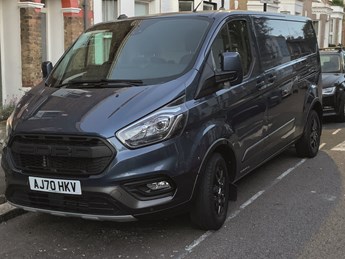- New Maxus EVs include eDeliver 5 van
- Used LCV values reach six-month high
- ADVERTISEMENT FEATURE: IVECO Daily Mission Awards 2024 Q2 Round-up: Grounds Maintenance & Forestry
- Stellantis Pro One electric vans review
- Mitie adds 5,000th EV to fleet
- Record number of CVs now on UK roads, SMMT reports
- Tyres: The path of least resistance
- ETRUX receives Ford Pro Convertor status
- The Logistics Organisation adds to van fleet with Vanaways
- Northgate launches micromobility service
Ford Transit Custom Trail (2020) review
Date: Thursday, October 28, 2021

|
|
Ford introduced a tranche of vans with enhanced traction capability towards the end of last year to serve customers working in various environments that are tougher than usual, but without needing a hardcore all-wheel drive LCV for serious off-road assignments.
The front-wheel drive Transit Custom Trail gets additional grip from a mechanical limited-slip differential (mLSD) to enable it to cope with loose, slippery or soft surfaces.
To differentiate it from the regular Custom’s appearance, the Trail features enlarged Ford lettering in the matte black grille with additional black cladding around the front and rear lower bumpers and side panels, complemented by 16ins alloy wheels and Trail logos on the front doors. The van can also be specified with roof rails and running boards.
Developed in partnership with driveline technology specialist Quaife, the mLSD automatically transfers engine torque in low-grip conditions to the wheel with the most traction, allowing Trail models to more efficiently tackle surfaces like unpaved roads, grass lanes and gravel tracks.
The vehicle’s electronic stability control system has been recalibrated to work with the mLSD. This technology has previously been used to enhance the traction and handling characteristics of Ford performance cars, including the Focus RS, Fiesta ST and Focus ST. It has no impact on CO2 emissions or fuel efficiency, according to the manufacturer.
The Custom Trail’s interior features leather seating, aircon, power-foldable door mirrors, Ford’s Quickclear heated windscreen and, of course, auto lighting as standard.
The Custom Trail is powered by Ford’s 2.0l EcoBlue diesel engine with a choice of 130, 170 and 185hp power outputs. We drove a panel van with the 170hp unit. The cabin can accommodate three occupants with a bench seat and driver’s seat.
Unusually, the middle passenger can travel in relative comfort as the casement for the six-speed manual gearbox does not intrude upon legroom. This also makes it easy for the driver to get across the cab if it’s safer to enter via the nearside door when making deliveries in heavy traffic, for example.
If the middle seat is not occupied, then the seat back pulls down to make a desktop with two cup holders and a strap to hold paperwork.
It is to Ford’s credit that the Trail drives as well as the regular two-wheel drive Custom, albeit with possibly a tad more road noise from the bigger wheels.
The steering is taut, well-weighted with no excess play and it is impressive how the steering wheel self-centres when coming out of corners.
The gear changes are typically slick and get the most out of the highly responsive 170hp powertrain.
Our van arrived with a “Parking Pilot Malfunction” flagged up on the dashboard, which signalled the reversing sensors were not functioning. As a consequence, we were grateful for the decent-sized side mirrors with wide-view sections, which we had to use when squeezing into tight spaces.
Mysteriously, the malfunction corrected itself after a couple of days, which was a relief as parking aids do much to prevent dings and dents and relieve the stress when working in busy city environments, not to mention potentially reducing downtime and insurance costs if bodywork damage is sustained.
The load bay in our van was well protected by ply-lining and accessed via a nearside door and twin asymetrical rear doors.
Ford Transit Custom Trail 2.0TDCI 170hp
Price (ex VAT) £30,749
Price range (ex VAT) £24,491-£34,441
Insurance group 39A
Warranty 3yrs/100,000mls
Service intervals 2yrs/25,000 mls
Load length 2,921mm
Load width (min/max) 1,351mm/1,775mm
Load bay height 1,406mm
Gross payload 974kg
Load volume 6.8m3
Engine size/power 1,999cc/170hp
Combined fuel economy 40.3mpg
CO2 183g/km
VerdictThe Trail adds enhanced traction and stylish touches to the excellent Custom line-up. |
8/10 |
|||
View The WhatVan Digital Edition


